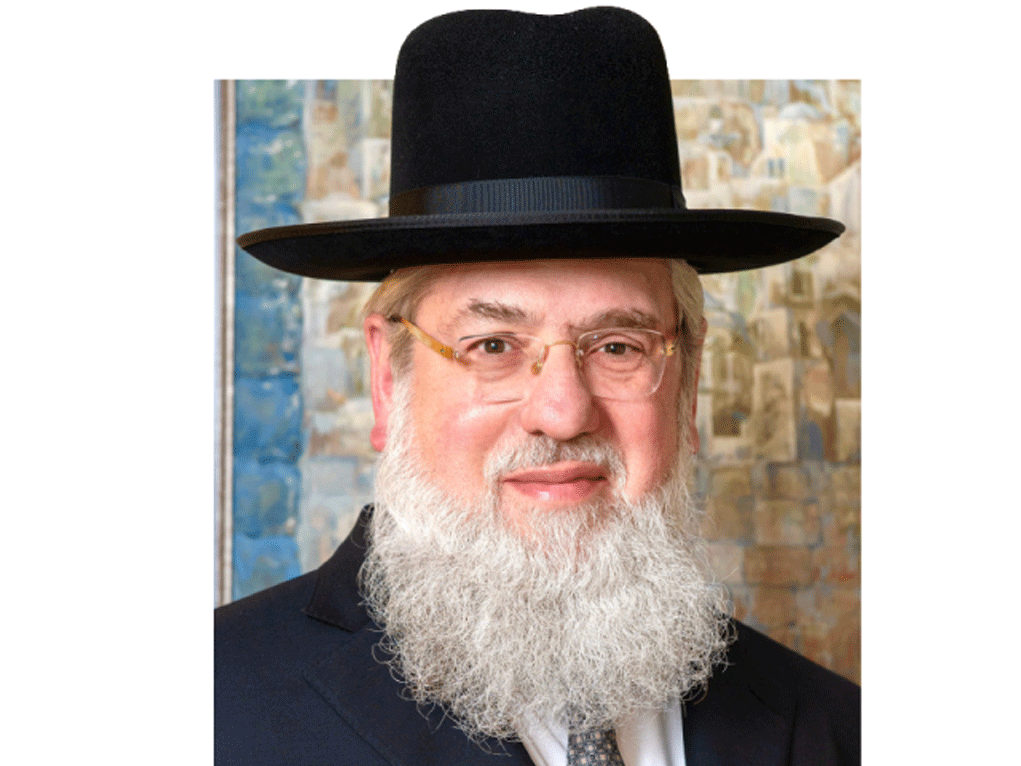There are times that are described as historic, but aren’t. There are times when, in hindsight, it becomes apparent that they were historic turning points. And then there are times such as ours, when it is obvious to all that they are historic. We are living through historic times on so many levels and in so many areas that it is hard to keep track.
We see the world changing before our eyes, but we don’t know where the changes will lead and how they will affect us.
In Eretz Yisroel, we witnessed an embarrassing military and intelligence disaster and a terrible tragedy in which over 1,200 people lost their lives, hundreds were taken hostage, a million people were evicted from their homes, lives were upended, and incomes were destroyed. A nine-month-long war unfolded as a result in Israel’s south, costing many more lives and unleashing an unprecedented torrent of international anti-Semitism. Jews fear for their lives, not only in Israel, but also in Western countries, where it has become accepted to bash Israel and Jews.
As the southern war shows signs of winding down before Israel has successfully completed its goals and achieved victory, a much more ferocious war in the north looms.
In Israel itself, people are deeply divided. The left is engaged in a concerted, multi-pronged effort to unseat the current government, which consists of right-wing parties and is led by Binyomin Netanyahu. As part of their campaign, they are focusing on chareidim, specifically targeting the draft deferment that allows young men studying Torah to decline army service. Stipends to yeshivos are being cut, and a range of financial penalties for bnei yeshivos and kollelim are being planned. Chinuch Atzmai, responsible for the education of many religious children, is also on the chopping block.
The United States, Israel’s ally, is no longer as dependable as it once was. The Democrat Party that controls the White House and Senate is openly anti-Semitic and hostile toward Israel and Jews. It is led by a weak, incompetent leader, who caused inflation to skyrocket, eroded the moral fabric of the country, and opened the borders to millions of unknown and undocumented people from around the world.
Russia battles Ukraine, with the West giving Ukraine just enough aid to keep them afloat, but not enough to win, so the war drags on and people continue to be killed. Russian President Putin visited North Korea last week and announced that he would help them be more of a pariah state and threat to the West.
China stirs the various pots as it prepares for its own war against Taiwan, becoming a greater adversary of the United States.
Iran remains the largest state sponsor of terror, supporting Israel’s enemies on the north and the south, while galloping towards developing nuclear weapons with which to attack Israel and the United States.
Our community is greatly affected by the nation’s economic woes and rising prices, with many families unable to afford basics. The mounting costs of home ownership have placed the dream of owning a home out of the range of affordability for average wage-earners. Tuition affordability has become a rapidly increasing concern, as families struggle to come up with enough money just to make ends meet.
As we watch these varied historical transformations play out, we worry and seek direction. People grow despondent and become depressed over what is happening. They worry about themselves and their families. They worry about Klal Yisroel. What is the correct approach in times like these?
This week’s parsha of Shelach is one of the most perplexing and tragic parshiyos of the Torah. A group of twelve leaders were selected to check out the land Hakadosh Boruch Hu promised the Jewish people. As Klal Yisroel approached the Promised Land, the people decided that they had to send a delegation to see the land.
These messengers are known for all time as the meraglim. All of them, Rashi says (13:3), were kesheirim when they departed for their tour. Upon their return, however, Rashi (13:26) says that just as they left b’eitzah ra’ah, with bad advice, they returned with bad intents. We are left wondering whether they were good people or bad people. If they were bad people, why did Moshe send them? And if they were good people, where did they go so wrong?
The Zohar (cited in Mesilas Yeshorim, Middas Hanekius) states that at the root of the sin of the meraglim was their concern that when Klal Yisroel would settle in Eretz Yisroel, they would lose their leadership positions. New situations would arise. A nomadic people would become stationary and no longer stateless; they would have their own country. New times would demand new leaders, and those who were effective in the desert would no longer be viewed as worthy leaders for the new world. The meraglim simply didn’t want to lose their jobs, and thus they viewed everything backwards.
The Zohar doesn’t say whether this fear was a conscious one or a subconscious one, and it is possible that the meraglim did not realize that their inner fears were influencing their judgment of what they were seeing as they marched up and down the land.
In fact, the Alter of Kelm taught that Korach, of whom we will learn in next week’s parsha, believed that he revolted against Moshe “lesheim Shomayim,” for holy reasons.
Subconscious intrusions led them to fail. Without regular study of mussar and steady self-improvement, a person can never be sure of himself and whether he is acting properly.
Twelve leading men of the Bnei Yisroel were given a mission to assess the Promised Land. As they crossed into the land that Hashem had promised their forefathers years before, they should have approached every town with the perspective that they were finally meriting to be in the land of destiny, where Avrohom, Yitzchok and Yaakov had lived. They had the merit of being the first members of the Bnei Yisroel to return to the eternal home of the Jewish people.
With Hakadosh Boruch Hu’s promises repeated so many times, they should have seen everything positively. “Oh, the town is empty! Great, we will be able to move right in. Wow, look at these luscious fruits! It will be so easy for us to provide food for our families. One grapefruit can feed the whole family, with enough left over for the next day.”
Most things that we encounter in life can be perceived positively and negatively. We must not permit our biases to taint our vision and perception. Hakadosh Boruch Hu promised this land to us and vouched for its quality and that we would inherit it, because it was created for us.
Had they not permitted their egos to spoil their vision, they would have seen the realization of Hashem’s promises wherever they went. They would have seen a beautiful land that gave birth to strong people and luscious fruits. Instead, they saw people dying and food that was impractical to carry.
They didn’t hear Hashem’s promises reverberating as they traveled throughout the land. Instead, they found fault in everything they saw. They denied the greatness of the land and they denied the Divine promise. Thus, they were resho’im.
With this, we can understand why Rashi says that at the time they left, they were honorable people, and then he writes that just as they returned with evil advice, they left with that same evil advice. They were honorable people when they left, but their advice was evil because it was tainted by their yeitzer hora and their bad middos, such as gaavah, arrogance.
Chazal wonder about the placement of the account of the meraglim in Parshas Shelach. They ask what the tale of spies dispatched to tour and report on the most splendid country on earth has to do with the story at the end of last week’s parsha pertaining to Miriam.
Chazal explain the connection: “Resho’im halalu ra’u velo lokchu mussar – The wicked ones saw what happened to Miriam but didn’t learn a lesson from it” (Rashi, Bamidbar 13:2, quoting the Tanchuma).
The meraglim were leaders, prominent and sincere people who apparently set out to do good. They returned with graphs, maps and demographic details that were factual and accurate. Their reports regarding the land were correct and were not disputed by Yehoshua and Koleiv.
Miriam had spoken to Aharon and they disagreed with something Moshe had done in his private life.
The Torah comments on their conversation, stating, “Veha’ish Moshe onov me’od mikol ha’adam asher al pnei ha’adamah – And the man Moshe was extremely humble, more than any person on the face of the earth” (Bamidbar 12:3).
The mention of Moshe’s humility seems unrelated to what they were discussing. Why is it here?
The Torah is saying that a person such as Moshe, who is most humble, cannot be accused of acting improperly. Moshe achieved the highest levels attainable by man. The only way he could have done something not in keeping with Hashem’s wishes and commandments would be if his yeitzer hora utilized his unperfected middos to cloud his judgment. A person who has perfected his middos and is fully humble cannot be misled by his ego, for he has none.
Thus, the Torah is informing us that Miriam was wrong for insinuating that Moshe had acted improperly in an interpersonal situation. This is the lesson that the meraglim should have learned from the incident. They should have perceived that in defending Moshe, the Torah discusses his humility, because a person who is humble is not misled by subconscious needs for gratification and power. They should have learned that lesson, but the wickedness in their hearts did not allow them to discern that.
The quintessential shliach for his people was Moshe Rabbeinu, whom the Torah testifies was onov me’od, free of personal ambition and calculations. Perhaps it was this that made him the most effective shliach and leader the Jewish people have ever been blessed with.
The Ramban writes in his famous letter that the attribute of humility, middas ha’anavah, is the greatest quality a person can be blessed with. Anavah leads to yiras Hashem. A person who is humble realizes that everything that he has is from Hashem and everything that exists is because Hashem created it. Therefore, he cannot sin and will not fall prey to subconscious fears of losing out on something, because he knows that whatever position he has, the amount of respect he has, and any power and authority that he possesses is because Hashem decided to give them to him.
The same lesson is applicable to us in our times. When we see and read and hear about historic changes affecting the world and us, we should recognize that these things are not happening because different people randomly got ideas in their heads to act in a certain way.
We should know better. Those people were resho’im, as they didn’t learn mussar, but we have the benefit of being able to learn from their sorry example, taking time once a week to read the Iggeres HaRamban, especially now with the new edition featuring the peirush of Rav Don Segal.
There are many mussar seforim available that are easily approachable and reinforce the messages that we need to remain anovim – humble, good people – who live with proper emunah and bitachon.
When there are wars and threats of wars, we recognize these as warnings from Hakadosh Boruch Hu for us to do teshuvah and improve ourselves. When things don’t go the way we would like them to, we need to turn to the sefer Chovos Halevavos and be reminded that Hakadosh Boruch Hu has a greater purpose in what He does. Those who remain faithful to Him, despite the nisyonos, challenges and hardships, are guaranteed to be helped.
When we see nations of the world realign, when we see Iran get stronger, we know that Hashem is preparing the world for Moshiach. Hakadosh Boruch Hu does His, but we have to do ours. There were times previously when everything was lined up for Moshiach to redeem us, but we weren’t ready. Hashem sends us reminders and wake-up calls, but we need to get the messages.
When we see and experience disconcerting things, we need to remain calm and not lose our equilibrium. Anshei emunah, people of faith, do not lose themselves in the moment, because they know that everything that happens is from Hashem and for a purpose. They remain tranquil in the face of challenges.
I’ve written previously of my grandfather, Rav Eliezer Levin, who learned in the great yeshiva of Kelm for seven years after learning in Radin for seven years. As one who transplanted himself and his family here from Lita during the war years, he went through much change and had many challenges in his life. Yet, he was always calm and disciplined, carrying himself with distinction into his nineties. As rov of a large city, he had many responsibilities, and he bore them with dignity and honor, never getting rattled or losing himself.
When I asked him how he managed that, he told me that every bochur was given a middah to develop when entering the yeshiva. His middah was savlanus, which includes even-tempered patience combined with serenity and humility.
“Zibben yohr hob ich ge’arbet oif der middah.” He explained that he worked on perfecting that middah for seven years while in Kelm and for the rest of his life.
The lessons we learn from these parshiyos of Sefer Bamidbar may seem simple because we have been hearing them since we were toddlers, but acquiring anavah is not simple and cannot be acquired through simple actions and lessons.
We need to pursue excellence to be and remain anoshim gedolim, solid and unshaken by the challenges of the times, not influenced by conscious or subconscious desires and egos. We must strengthen ourselves and our middos tovos so that we do not fall to any temptations, including those for honor and prestige, as they also lead to sin.
We need to learn the lessons of our forefathers, who learned and lived the teachings and messages of the pesukim, so that we can maintain our equilibrium and emunah in these trying and truly historic times, meriting the coming of Moshiach speedily and in our day.







